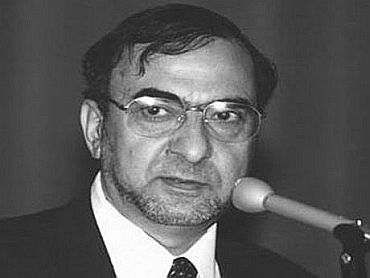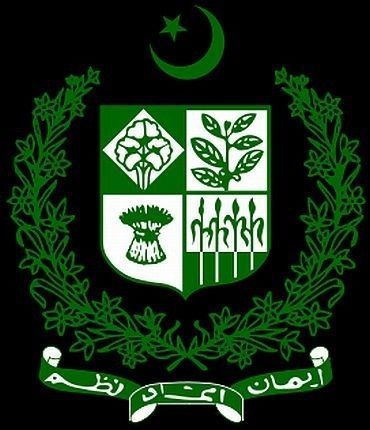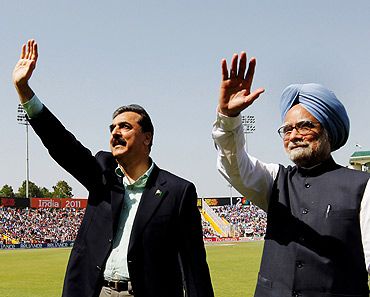Sushant Sareen
The arrest of Pakistan's Inter-Services Intelligence agent Ghulam Nabi Fai has left many red faces in India, some out of embarrassment, others out of anger. Frankly, both the embarrassed and the angry are being disingenuous -- the former because their feigned ignorance over where Fai was coming from (or should we say, where his money, his agenda and his instructions were coming from) rings hollow, and the latter because had they been really as outraged as they are appearing to be, they would have blown the whistle on him and his 'peace' gravy train many years ago.
Anyone who had been tracking Pakistan and Kashmir could not but have suspected, even if without any hard evidence, Fai's credentials as an 'ambassador' of Kashmiris. He was quite clearly a shady character who cloaked himself in the garb of a Kashmir lobbyist to hide his radical Islamist and pro-Pakistan leanings so as to gain acceptability in the West.
The fact that he has now been officially exposed as an ISI-funded event manager and as such been put out of business needs to be celebrated, more so because this expos will make it very difficult for other Fais in places like London or Brussels to peddle their hatred of India in the name of 'struggling' for the 'right of self-determination' of the Kashmiris.
Actually, Fai's operation was hardly novel. If anything, it is one of the oldest tricks in the book of intelligence agencies and is part of a well worn out psychological warfare campaign under which the seminar/conference circuit is used to funnel money to sway public opinion in favour of one or another 'cause.'
The author is consultant, Pakistan Project, at the Institute for Defence Studies and Analyses, New Delhi
...
Pakistan's one of the worst kept secrets
Image: Kashmiri separatists hold torches to mark International Human Rights Day in SrinagarPhotographs: Fayaz Kabli/Reuters
It is, however, critical that the person spearheading this campaign as its public face must enjoy some credibility and legitimacy to engage the relevant people to plug the line of his masters, or as the case is, paymasters. Unfortunately for Fai and others of his ilk, they have now lost both their credibility as well as their legitimacy (not to mention their jobs) to act as spokesmen of the 'Kashmir cause.'
Fai, however, was only one of the prongs of the ISI's public relations campaign on Kashmir, but to his credit, he survived (and thrived) for the longest time. Since the early 1990s, the Pakistanis have spread a lot of money -- directly, through their diplomats, and indirectly, through their spooks and agents like Fai -- to build up opinion in Western capitals in favour of Pakistan's position on Kashmir. There is the infamous case of the current Pakistan high commissioner in London giving some 250,000 in the 1990s to a British lawmaker who was 'committed' to raising his voice for the Kashmiris.
After being outed because of a political tussle inside Pakistan, the lawmaker self-righteously returned the money to the Pakistan high commission. The money, however, never reached the coffers of the Pakistan government!
Over the years, the ISI has latched on to Western academics and think-tanks who toe the Pakistani line in their books and papers. A couple of recent books on Pakistan by some dubious Western academics, which not only present a very different, and sympathetic, picture of that country from the one painted by its own media but also stand as glowing, if not gushing, testimonials of the Pakistan army, are probably a case of 'chamak' (loosely translated as glint) -- a term used by the late Benazir Bhutto to describe her rival Nawaz Sharif's ability to use lucre to win administrative, judicial and political support -- at work at the international level.
That Pakistan was spending money to buy support not only in the West but also in Kashmir is one of the worst kept secrets. A number of top Hurriyat leaders have been candid about having enjoyed Pakistan's benefaction. There is, therefore, no reason to be shocked that the ISI was funding people like Fai because this is something that any intelligence agency worth its salt would do.
Chances of Pak recruiting new backers anytime soon appear bleak
The shock is more over the pathetically small amounts of money -- around $ 4 million over a 20 year period and around $ 100,000 per annum -- that the ISI was using to buy support in the US. Even if the Federal Bureau of Investigation hasn't got all the numbers correct and we raise the figure by two or three times, it still remains a fairly insignificant amount especially given how beloved a cause Kashmir is for Pakistan.
The amount devoted to buying support for Kashmir becomes starker when you compare it with the $3 million that a former Pakistan army chief is supposed to have received in bribes from the North Koreans for allowing transfer of nuclear technology. While this comparison shows the real value attached to Kashmir by Pakistan, it also raises serious questions about how cheaply some of Pakistan's backers in the US Congress and Senate might have sold themselves.
Either because they have now realised that they were short-changed by the Pakistanis or because they genuinely feel they were taken for a ride by Fai, the ISI's clumsiness in handling 'chamak' has resulted in most of Pakistan's backers disassociating themselves from the 'Kashmir cause,' and chances of Pakistan being able to recruit any new backers anytime soon appear rather bleak.
As for the Indian participants in the Fai-organised, ISI funded jamborees, a few caveats are in order. There can really be no objection at all if some Indian partakes ISI hospitality and makes a financially bankrupt Pakistan spend a few thousand dollars to fly him first class (even business class should be acceptable), has himself put up in an expensive five-star hotel, is paid a per diem and wined and dined and all this to give a mouthful on Pakistan's sponsorship of terrorism in Kashmir and make a robust defence of India's position on the same issue.
Should there be no track-II meetings?
Image: Fai addressing a seminar in USThe only problem is that people who generally get invitations to such events are often those who are already toeing the Pakistani line, or are seen as moldable in favour of the Pakistani cause. The icing on the Pakistani cake is of course those Indians or Indian-origin foreigners -- the Chatterjees, Roys and Navlakhas come to mind -- who act as good show boys for the Pakistani cause by bad-mouthing India and everything Indian in international forums.
The other problem is that invariably jamborees like the one organised by Fai come out with 'declarations' that convey a sort of 'consensus' reached between the participants of the event, who despite not representing anyone but themselves pretend as though they are representatives of their countries. Often enough, even though some of the participants might have serious reservations over the wording of the 'declaration,' they feel obliged to not make much of an issue over every clause or comma even if it compromises the national position. Others don't make an issue because they are cynical enough to know that these 'declarations' have absolutely no meaning since they will be consigned to the dustbin by their government.
Does this mean that there should be no track-II meetings? Far from it. There is a need to encourage even more track-II meetings, albeit with greater transparency of the organisers and their source of funds.
The lesson for the Indian government
Image: PM Singh with his Pakistani counterpart Yousuf Raza Gilani during the ICC World Cup semi-finals in ChandigarhPhotographs: Reuters
There is also a lesson for the Indian government in la affair Fai. It is no good for the government to take the position that there is nothing it can do if someone decides to participate in an ISI-organised event. At the very least, the government can inform the participants, some of whom might genuinely be unaware of the antecedents of the organisers, of what they are getting into.
After that it should be left to the discretion of the individual whether or not he will participate. At least this way no one can take the plea that they weren't aware of what the conference was all about.
It is also important to be clear that no track-II meeting in either India or Pakistan is possible without some sort of clearance by the government in India and the 'agencies' in Pakistan. But to construe from this that every such meeting is stage-managed or micro-managed by the 'agencies' is to stretch things a little too much.
While track-II meetings don't lead to anything tangible, they nevertheless serve as an important forum for greater interaction between the people of the two countries and do help in gaining a better insight and knowledge of the other side.
If some Indians are able to say their thing and get a better understanding of Pakistan, and that too at the ISI's expense, what can be better than that?






article